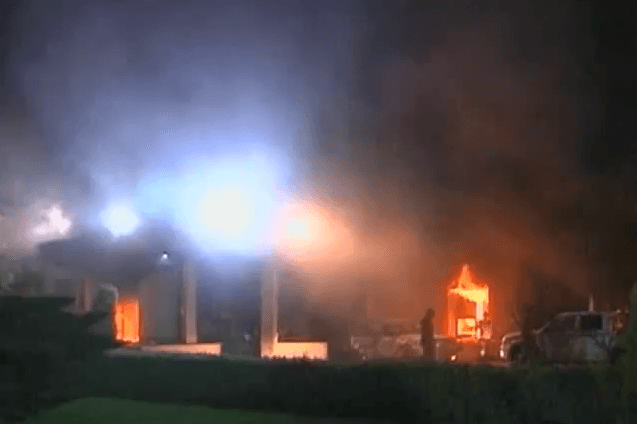Top suspect in Libya consulate attack still hasn’t been questioned
The U.S. consulate in Benghazi burns the night of the terrorist attack that took the life of U.S. Ambassador Chris Stevens. (Photo courtesy of Voice of America via Wikimedia Commons.)
New York Times Reporter David Kirkpatrick sat for two hours on a hotel patio with Ahmed Abu Khattala, the man that U.S. authorities and witnesses say was a ringleader of the attack on the U.S. diplomatic compound in Benhazi.
That attack killed four Americans, including U.S. Ambassador Christopher Stevens, but Abu Khattala denies any responsibility. In fact, while he admits he was present at the attack, he says he was only trying to help out.
To be sure, Khattala isn’t worried about anyone coming after him because of the attacks. He called the Libyan National Army a “national chicken.” And he scoffed at the notion that the United States would do anything about it.
“(Politicians are just) playing with the emotions of the American people,” he said to Kirkpatrick, “(and) using the consulate attack just to gather votes for their elections.”
Khattala says no officials have even sought to question him about the attack.
Kirkpatrick, speaking from the streets of Benghazi, said the Libyan government is quite weak right now, without a national police force or army to enforce its wishes. Instead, it’s forced to rely on self-formed militias, to do work on the government’s behalf.
“In this case, it turns out those militias appear to be reluctant to do the work of rounding up even the most obvious suspects for questioning,” Kirkpatrick said.
This whole situation, Kirkpatrick said, is going to frustrate the Obama administration and draw attention to the difficult circumstances the Obama administration and the Libyan authorities find themselves in.
Here’s a guy who has admitted he was at the scene, and is the kind of person you’d immediately want to question after an incident like this, and yet no one has even approached him.
“We were the first to come calling,” Kirkpatrick said.
The Obama administration now has to deal with the fact that, during the debates, Obama said U.S. officials would go and get anyone responsible for these attacks — and yet there’s really no means of doing that.
Even if they wanted to go get him, there’s no real set way of going about that. Kirkpatrick suggested bringing in some outside militia, from another part of the country, based on what’s worked in Libya in the past.
“Short of some group of American troops on the ground, which would be extremely unpopular here,” he added.
